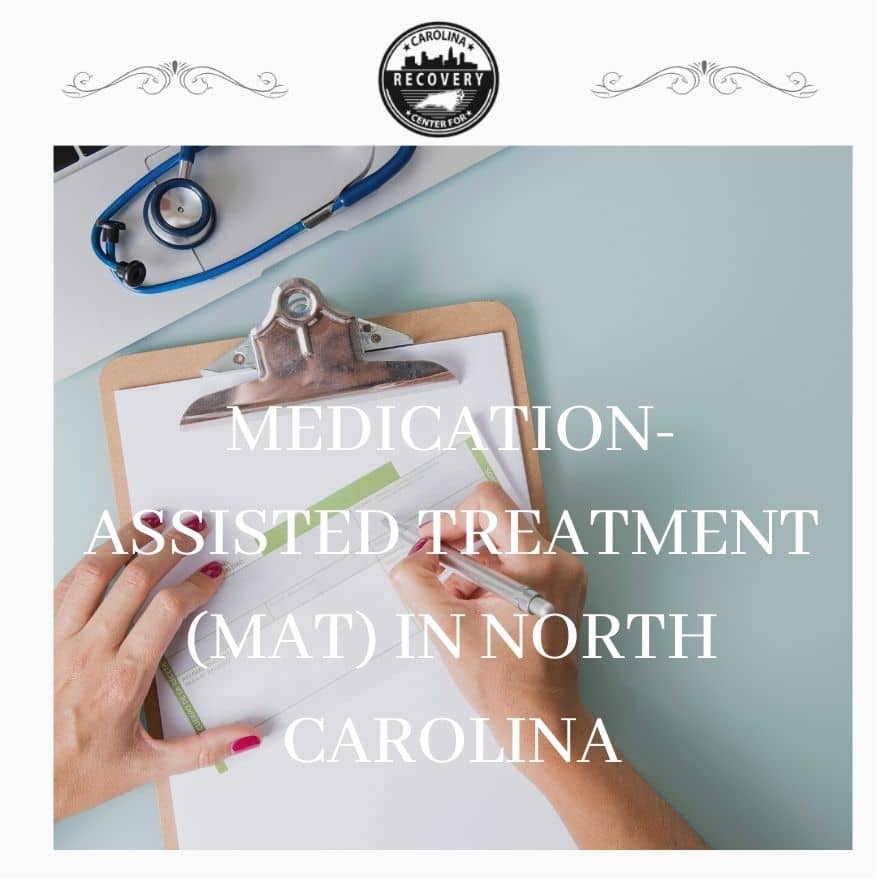Medication Assisted Treatment (MAT) in North Carolina

Medically Verified: 2/1/24
Medical Reviewer
Chief Editor

All of the information on this page has been reviewed and verified by a certified addiction professional.
Millions of people in the United States live with an addiction to opioids and alcohol. Without getting the treatment they need, many people living with addiction will face serious, negative consequences to their physical and mental health. Many people also experience life-altering legal or financial trouble or life-threatening harm that stems from their addiction.
Addiction is a complex condition that impacts every aspect of a person’s life. For this reason, comprehensive addiction treatment must address the physical, psychological, and environmental roots of addiction. It is not enough to simply treat either the behavioral or physical causes of addiction. All aspects of addiction must be treated to give a person the best chance at putting addiction behind them and moving forward.
Medication-assisted treatment (MAT) in North Carolina offers the comprehensive support and care that people with addiction need to overcome the condition and live a healthy, sober lifestyle. Learning more about this treatment option may help you or someone you love to make informed choices about your care.
What is Medication-Assisted Treatment (MAT)?
Medication-assisted treatment, or MAT, is a type of addiction treatment that uses medications to alleviate discomfort and reduce cravings for drugs and alcohol. It is often used to treat opioid or alcohol addiction.
In a typical North Carolina MAT program, people would participate in a combination of treatments and therapies that work together to treat the whole person. These include:
- Intake assessment and evaluation
- Individual psychotherapy or counseling
- Medically-supervised detox
- Medication management
Many treatment programs also include group therapy, education, family therapy, and holistic treatment like nutrition counseling, exercise, and mindfulness practices.
Instead of only receiving behavioral or mental health therapy, a person also receives medications during each stage of treatment. These medications can help keep them safe and comfortable during withdrawal and lessen the intensity of cravings during treatment and aftercare.
In some cases, medication-assisted treatment allows people to receive care on an outpatient basis during detox or treatment. In others, it is another tool for medical and addiction specialists to offer at every level of care, including inpatient and residential programs.
What Medications are Used During Medication-Assisted Treatment in North Carolina?
Different medications are used during treatment for different addictions. None of the medications are intended to “cure” the addiction. Instead, they offer relief for specific symptoms, reduce cravings, or reduce the chances of complications from withdrawal.
In medication-assisted treatment for alcohol addiction, common medications include:
- Acamprosate
- Disulfiram
- Naltrexone
In MAT for opioid addiction, common medications include:
- Buprenorphine
- Methadone
- Naltrexone
These medications can be safely taken for long periods and have been approved for lifetime use if needed.
Naloxone is a medication that can be given to people who are suspected of having an overdose on opioids. It is not taken during treatment but can reverse the toxic, life-threatening effects of opioids during an overdose.
What are the Goals of MAT?
The goals of medication-assisted treatment are simple: to help people overcome addiction and live healthy, fulfilling lives of their choice. Medication-assisted treatment offers whole-person treatment that aims to address the complexities of addiction. Full recovery is the goal for each person, regardless of the length or severity of their addiction.
While the overall goal of MAT is complete recovery, within that goal are several other measurable outcomes. These include:
- Decrease illicit activity related to opioid use
- Increase a patient’s odds of survival
- Keep people invested in the treatment process
- Improve people’s ability to get hired and work
- Decrease pregnancy and birth complications in pregnant people with addiction
Medication-assisted treatment has been shown to improve a patient’s short and long-term success in treatment. This means a better experience during the treatment process and more hope for lifelong recovery.
Is MAT Effective?
Research into the effectiveness of medication-assisted treatment has been positive. First, using MAT has been shown to be very effective in helping people achieve recovery from addiction. This is especially true for people living with opioid addiction.
Medication-assisted treatment works well because it treats multiple aspects of addiction instead of focusing only on its physical roots. MAT can help people have a more comfortable experience during withdrawal and treatment, which helps with retention.
People who participate in MAT have also been shown to have a reduction in their risky behaviors like needle-sharing. This has the added benefit of reducing a person’s exposure to Hepatitis C and HIV. It has also been shown to reduce the likelihood of overdose in people with opioid addiction.
For people living with opioid or alcohol addiction, medication-assisted treatment offers the best chance to overcome addiction.
Find a Medication-Assisted Treatment Program in North Carolina
If you or someone you love require addiction treatment or support during addiction recovery, reach out to the specialists at the Carolina Center for Recovery. We offer a range of accredited substance abuse treatment programs designed to help you overcome addiction and live the healthy life you choose.
Don’t wait another day for the treatment and support you need. For more information about starting a medication-assisted treatment program or another type of treatment, reach out to our staff today.

